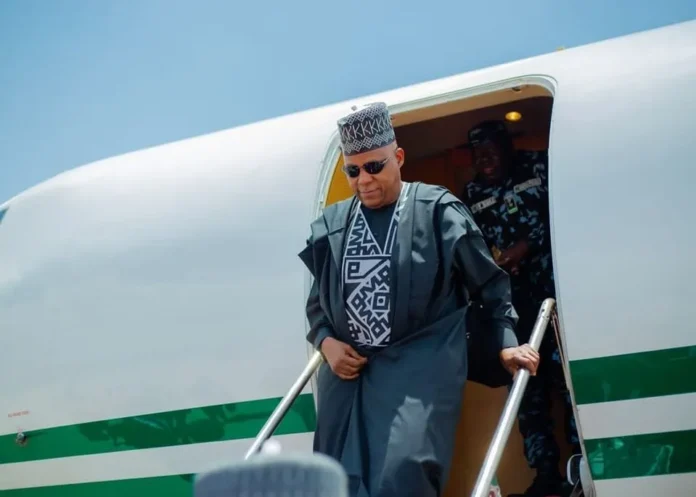Vice President Kashim Shettima arrived in Addis Ababa, Ethiopia, on Sunday to represent Nigeria at the second United Nations Food Systems Summit — with a powerful symbol of agricultural diplomacy in hand: the donation of 2,000 cashew seedlings and 100,000 cashew seeds to the host country.
His aircraft touched down at Bole International Airport at exactly 4:26 p.m. local time. On hand to welcome him were Ethiopian Deputy Prime Minister Temesgen Tiruneh and top Nigerian officials, including Ambassador Nasir Aminu, Nigeria’s Chargé d’Affaires in Ethiopia.
Others at the airport included Dr. Suleiman Dauda, Finance Attaché; Wing Commander Gabriel Batubo, Deputy Defence Attaché (Air Force); Ambassador Macy Ogbede, Deputy Head of Mission; and Mr. Jangado Ishaku, First Secretary.
Shortly after arrival, Shettima huddled with members of Nigeria’s delegation in a strategy session. Among those present were the Technical Assistant to the President on Agriculture and Executive Secretary of the Presidential Food Systems Coordinating Unit (PFSCU), Marion Moon.
According to a statement by Stanley Nkwocha, Senior Special Assistant to the President on Media and Communications (Office of the Vice President), the Vice President was fully briefed on Nigeria’s agenda and expectations at the high-level summit.
During the event, which runs from July 27 to 29, Shettima will join world leaders in key discussions, including high-stakes sessions on transforming the global coffee value chain, as well as strategic roundtables on building resilient, inclusive, and sustainable food systems.
The summit serves as a global progress review following the inaugural Food Systems Summit in 2021, with renewed focus on commitments to food security, agricultural innovation, and climate resilience.
Nigeria’s threefold agenda at the summit, as articulated by the Vice President at a pre-summit briefing in Abuja, includes: Positioning Nigeria as a continental leader in food systems transformation; Aligning global partnerships with Nigeria’s domestic agricultural priorities; and Championing a private-sector-led approach to achieving food security across Africa.
As part of Nigeria’s contribution to agricultural cooperation and South-South solidarity, the country donated cashew seeds and seedlings capable of cultivating about 600 hectares of farmland in Ethiopia — an offering symbolizing not just friendship, but a shared commitment to African food sovereignty.

